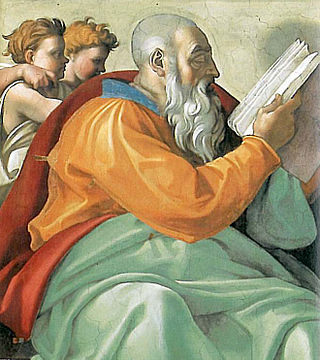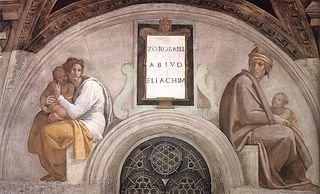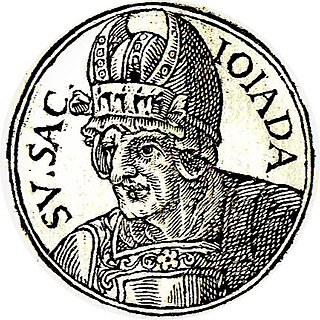Related Research Articles
Abijah is a Biblical Hebrew unisex name which means "my Father is Yah". The Hebrew form Aviyahu also occurs in the Bible.

Zechariah was a person in the Hebrew Bible traditionally considered the author of the Book of Zechariah, the eleventh of the Twelve Minor Prophets.
Abiezer or Abieezer is the name of three Biblical characters. The name means "father of help" i.e., helpful. The characters are:

There are two biblical characters named Abihud.

Ahimaaz was son of the high priest Zadok.

Ahimelech was an Israelite priest and served as the grand priest of the town of Nob. In the Book of Samuel, he was described as the son of Ahitub and father of Abiathar, but described as the son of Abiathar in 2 Samuel 8:17 and in four places in 1 Chronicles. He descended from Aaron's son Ithamar and the High Priest of Israel Eli. In 1 Chronicles 18:16 his name is Abimelech according to the Masoretic Text, and is probably the same as Ahiah.
Ahoah ("brotherly") was one of the sons of Bela, the son of Benjamin. He is also called Ahiah and Iri. His descendants were called Ahohites.
In the Hebrew Bible, Alemeth was:
Amariah means "promised by God" in Hebrew. It was commonly used as a name of priests in the History of ancient Israel and Judah. It appear several times in the Hebrew Bible:
- One of the descendants of Aaron by Eleazar. He was probably the last of the high priests of Eleazar's line prior to the transfer of that office to Eli, of the line of Ithamar.
- A Levite, son of Hebron, of the lineage of Moses.
- A "chief priest" who took an active part in the reformation under Jehoshaphat ; probably the same as mentioned in 1 Chronicles 6:9.
- An ancestor of Ezra.
- One of the high priests in the time of Hezekiah.
- Great-grandfather of Zephaniah.
- Great-grandfather of Athaiah.
- One of the persons who sealed the covenant.
- One of the persons who had taken 'strange wives'.
The name Ammiel may refer to several people in the Hebrew Bible. Etymologically, it means "people of God", and is used for the following individuals:

According to the Tanakh, עזה, Uzzah or Uzza, meaning "Her Strength", was an Israelite whose death is associated with touching the Ark of the Covenant. The account of Uzzah appears in two places in scripture: 2 Samuel 6:3-8 and 1 Chronicles 13:7-11.
Seraiah or Sraya is the name of several people mentioned in the Hebrew Bible, and a name with other non-biblical uses.

Ephraim was, according to the Book of Genesis, the second son of Joseph ben Jacob and Asenath, as well as the adopted son of his biological grandfather Jacob, making him the progenitor of the Tribe of Ephraim.

Mephibosheth, or Miphibosheth, was the son of Jonathan—and, thus, a grandson of Saul—mentioned in the Biblical Books of Samuel and Chronicles.

Asahel was a military leader under King David and the youngest son of David's sister Zeruiah. Asahel Andknl
thus was the nephew of David and the younger brother of David's general, Joab, Asahel is mentioned in 2 Samuel chapters 2 and 3.
Ahiman is the name of two persons in the Bible:
Baale of Judah, meaning "lords of Judah" or "citizens of Judah" was a city in the tribe of Judah from which David brought the ark into Jerusalem. In 1 Chronicles 13:6, the city is called Kirjath-jearim. According to Wilhelm Gesenius, the town of Baale of Judah is referred to not only as Kirjath-Jearim but also as Baalah.

Jehoiada in the Hebrew Bible, was a prominent priest in the kingdom of Judah during the reigns of Ahaziah, Athaliah, and Joash. Jehoiada became the brother-in-law of King Ahaziah as a result of his marriage with princess Jehosheba. Both Jehosheba and Ahaziah were children of King Jehoram of Judah. Ahaziah died a year after assuming the throne, which was then usurped by his mother Athaliah, who ordered the execution of all members of the royal family.
Meshullam is a biblical masculine name meaning "Befriended".
Khoda Raham is a village in Dust Mohammad Rural District, in the Central District of Hirmand County, Sistan and Baluchestan Province, Iran. At the 2006 census, its population was 19, in 6 families.
References
![]() This article incorporates text from a publication now in the public domain : Easton, Matthew George (1897). "Raham". Easton's Bible Dictionary (New and revised ed.). T. Nelson and Sons.
This article incorporates text from a publication now in the public domain : Easton, Matthew George (1897). "Raham". Easton's Bible Dictionary (New and revised ed.). T. Nelson and Sons.